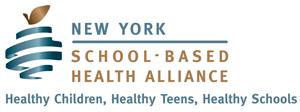Benefits of SBHC
Research and evaluations have demonstrated that school-based health centers represent cost-effective investments of public resources.
- A study by Johns Hopkins University found that school-based health centers reduced inappropriate emergency room use among regular users of school-based health centers.1,2
- A study of school-based health center costs by Emory University School of Public Health attributed a reduction in Medicaid expenditures related to inpatient, drug and emergency department use to use of school-based health centers.3
- School-based health centers have demonstrated that they attract harder-to-reach populations, especially minorities and males, and that they do a better job at getting them crucial services such as mental health care and high-risk behavior screens. Two studies found adolescents were 10-21 times more likely to come to a SBHC for mental health services than the community health center network or HMO.4,5
- A national multi-site study of school-based health centers conducted by Mathmatica Policy Research found a significant increase in health care access by students who used school-based health centers: 71% of students reported having a health care visit in past year compared to 59% of students who did not have access to a SBHC.6
- A study of elementary school-based health centers conducted by Montefiore Medical Center found a reduction in hospitalization and an increase in school attendance among inner-city school children for asthma.7 Another study on school-based health care’s effects on asthma found decreases in hospitalization rates of 75-85% and improvements in the use peak flow meters and inhalers.8
- Adolescents who received counseling services in a school-based health center significantly decreased their absenteeism and tardiness, while those not receiving counseling slightly increased their absence and tardiness rates.9
- A study of student users of health centers found that students who reported depression and past suicide attempts were significantly more willing to use the clinic for counseling services. Those with perceived weight problems reported more willingness to use a school clinic for nutrition information than those who did not feel overweight. Sexually active students were willing to seek information on pregnancy prevention and to have general disease checks.10
- Dallas school-based health centers found that medical services helped decrease absences by 50% among students who had three or more absences in a six-week period; students who received mental health services had an 85% decline in school discipline referrals.11
1. Key JD, Washington EC, Hulsey TC. Reduced Emergency Department Utilization Associated with School-Based Clinic Enrollment. Journal of Adolescent Health. Apr 2002;30(4):273-278.
2. Santelli J, Kouzis A, Newcomer S. School-Based Health Centers and Adolescent Use of Primary Care and Hospital Care. Journal of Adolescent Health. 1996;19:267-275.
3. Adams EK, Johnson V. An Elementary School-Based Health Clinic: Can it Reduce Medicaid Costs? Pediatrics. Apr 2000;105(4 Pt 1):780-788.
4. Juszczak L, Melinkovich P, Kaplan D. Use of Health and Mental Mealth Services by Adolescents Across Multiple Delivery Sites. Journal of Adolescent Health. Jun 2003;32(6 Suppl):108-118.
5. Kaplan D, Calonge B, Guernsey B, Hanrahan M. Managed Care and School-based Health Centers: Use of Health Services. Archives of Pediatric and Adolescent Medicine. 1998;152:25-33.
6. Kisker EE, Brown RS. Do School-Based Health Centers Improve Adolescents Access to Health Care, Health Status, and Risk-Taking Behavior? Journal of Adolescent Health. 1996;18:335-343.
7. Webber MP, Carpiniello KE, Oruwariye T, Lo Y, Burton WB, Appel DK. Burden of Asthma in Inner-City Elementary Schoolchildren: Do School-Based Health Centers Make a Difference? Archives of pediatrics & adolescent medicine. Feb 2003;157(2):125-129.
8. Lurie N, Bauer EJ, Brady C. Asthma Outcomes at an Inner-City School-Based Health Center. J Sch Health. Jan 2001;71(1):9-16.
9. Gall G, Pagano ME, Desmond MS, Perrin JM, Murphy JM. Utility of Psychosocial Screening at a School-Based Health Center. Journal of School Health. Sep 2000;70(7):292-298.
10. Riggs S, Cheng T. Adolescents Willingness to Use a School Based Clinic in View of Expressed Health Concerns. Journal of Adolescent Health Care. 1988;9(208-213).
11. Dallas Youth and Family Centers Program: Hall L. Final Report undefined Youth and Family Centers Program 2000–2001 Dallas, TX: Dallas Independent Schools District;2001.
Become a Member
Regular member communications, advocacy updates, alerts & webinars are only some of what you receive as a NYSBHA member
Donate
Your donation plays an essential role in the Alliance’s ability to achieve its vision of "Healthy Children, Healthy Teens, and Healthy Schools."
Contact Us
Get in touch with NYSBHA
